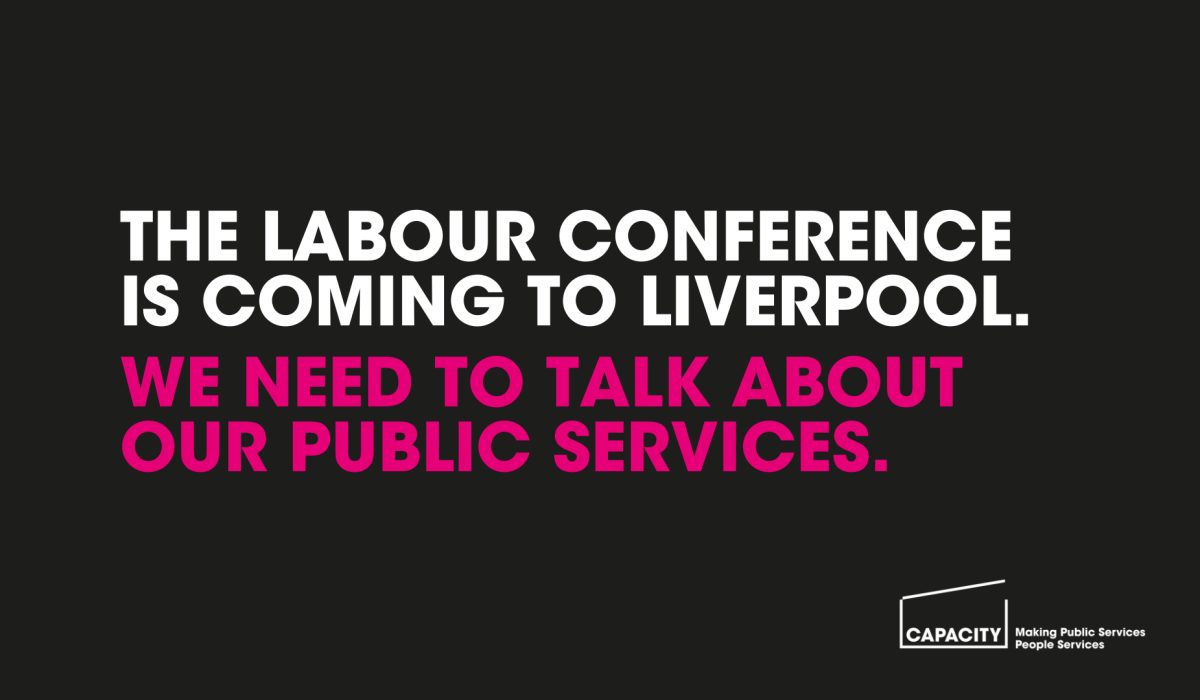The new government is coming to town. We need to talk about public services.
- Chris Catterall, CEO
- September 20, 2024
- Categories: Capacity Insights
We’re just a few days away from Labour returning to Liverpool City Region for their first party conference since the election. It’s a big moment for the new Government and for the city region. This is the first time in recent history that a government has held a conference in the city. Among the many issues demanding urgent attention and resources, one stands out. For the first time in a generation, the need to revitalise and improve the UK’s public services is high on everyone’s agenda. It feels like Capacity’s agenda (public service innovation) is now THE agenda.
What better way to showcase the innovation in public services happening in Liverpool City Region than the new Government rolling into town. The opportunity for the new Government to work with the Combined Authority and local authorities to deliver the missions set out in the King’s Speech is compelling. So, what’s on Capacity’s wish list for the PM and his Cabinet to tackle? On the off chance he might be walking past of our offices on Dale Street, we asked the team what three issues should be top of the PM’s to-do list.

Something close to our hearts is children’s residential care. We are Juno is our not-for-profit children’s residential care company. It gives us a unique insight into the care system in the UK. Wes Streeting, the new Health Secretary, is right. Children in crisis are suffering from a broken system. Monetised and experiencing a slow-moving, fractured, bureaucratic care system. Watch this C4 recent feature to see the real human impact.
Children and young people are being placed hundreds of miles away from their families, friends, schools, and the communities that are so important to them. With the support of the Combined Authority, Wirral Council and Postcode Innovation Trust, we’re pioneering a new approach in the Liverpool City Region. Juno is on a mission to create homes where children and young people feel safe, loved and supported in all aspects of their emotional, physical, and educational development.
Our plan is to open ten Juno homes in the next five years. It’s a model that can be replicated and accelerated. With government support, there can be a sustainable alternative to profit-driven models that dominate the children’s residential landscape.
The need for innovation in public services has never been stronger or more urgent. That innovation has to be more focused on prevention. For too long, organisations have been forced to use resources to deal with people in crisis and acute need. The new Government has to champion a culture of preventative public services. And that means multi-year spending commitments that focus on preventative innovation and cross-governmental working.
Preventative support is something we think a lot about as a team. Our work with Wirral Council to change the face of Early Help has been the catalyst for a new way of working. The Family Toolbox was designed with an Alliance of third-sector organisations working together with Wirral Council, sharing risk and responsibility for success, and promoting earlier, more family-centred interventions at the community level. It removed strict assessment criteria, reduced handoffs between services and instilled a supportive strength-based approach. Since its launch, it’s supported more than 700 families. In July, this year it won The MJ’s Transforming Lives Award.
There are great examples of preventative services up and down the country, but there’s still a long way to go to achieve the government’s ‘prevention first revolution’. This week Liverpool-based social enterprise Transform Lives and housing association Plus Dane launched Job Plus – a pilot project offering community-led employment support to people living in Toxteth. It’s another powerful example of organisations working together to rethink person-focused, grassroots support for tackling unemployment.
As a team working at the intersection of design and doing in public services, the Government’s focus on public services is encouraging. For too long, they’ve taken a back seat – undervalued and under-resourced. But without a clear focus on prevention, the vast majority of resources will continue to be spent on day-to-day, urgent provision rather than long-term improvements and outcomes. It’s difficult. Change won’t happen overnight but in the long term, prevention policies will mean better outcomes and drive down costs over time.
Public services are the beating heart of our communities. That’s why faster, deeper devolution is essential to transforming our public services. And that shift of power feels real.
The sight of regional Mayors, including Metro Mayor Steve Rotheram, inside Downing Street so soon after the election was a powerful sign of the new Government ready to loosen its grip and put more powers into the hands of people who know their areas best. That devolution should be mirrored at a local level by combined and local authorities. Bringing decision-making closer to communities and giving local people (at a ward and neighbourhood level) the resources and flexibility to design and implement what works best for them.
Closing thoughts…
At Capacity, we think about different ways public services could work. This year’s Labour Conference gives the new government an opportunity to take on one of its biggest challenges. To share their vision of what public services look like in the future. Making the changes necessary to transform our public services won’t be without its challenges (even normalising them would be a start!). But the rewards for innovation, creativity and making a difference to people’s lives of are worth fighting for. Any mission-orientated government has to recognise and enable that.
Let’s hope there are no glitter bombs to grab the headlines at this year’s conference.